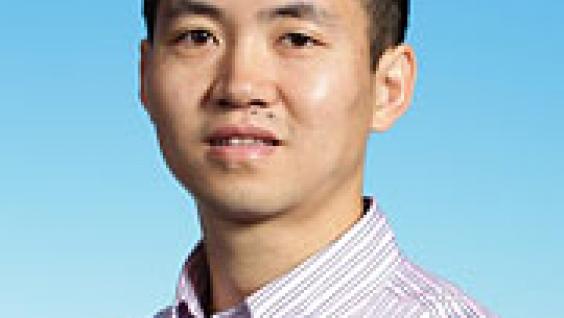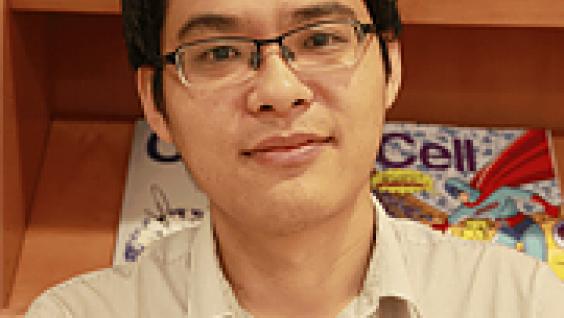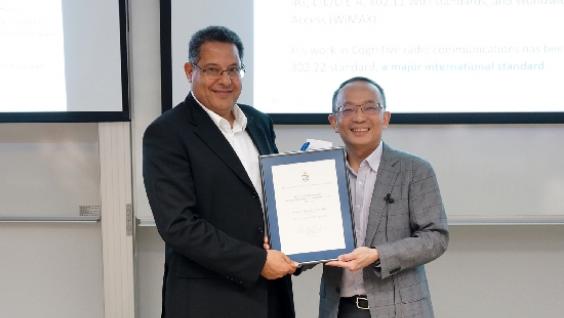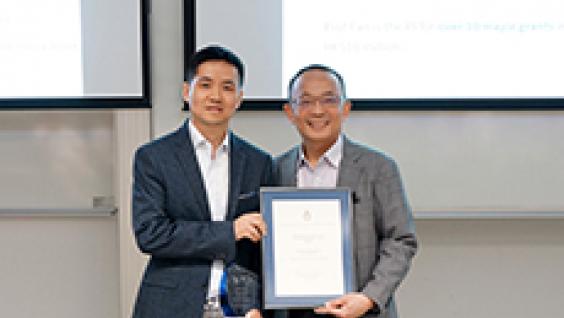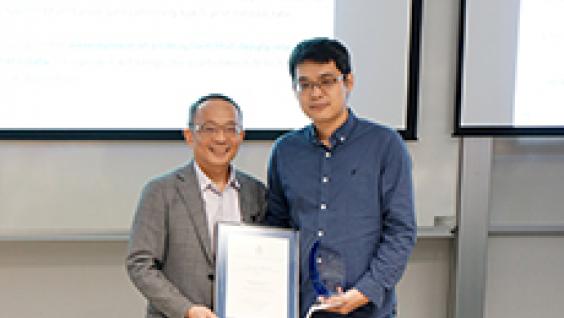Faculty Recipients of Research Excellence Awards Demonstrate Joys of Discovery
After a rigorous review by the Engineering Research Award Selection Committee, three outstanding faculty members have had their achievements recognized with the School of Engineering Research Excellence Awards 2018-19.
The Committee is chaired by Prof. ZHAO Tianshou and included the following members, Prof. HSING I-Ming, Prof. Hong LO, Prof. ZHANG Qian, Prof. Daniel PALOMAR and Prof. LEE Chung-Yee.
Prof. Khaled BEN LETAIEF
This year's Distinguished Research Excellence Award, the most prestigious accolade, was awarded to Prof. Khaled Ben Letaief, the New Bright Professor of Engineering and Chair Professor of Electronic and Computer Engineering.
Prof. Ben Letaief is a leading international scholar who is highly respected with vastly impactful contributions which were carried out mainly at HKUST. He has made a number of influential contributions to broadband wireless communications, which have helped enable the wireless revolution of the past two decades.
The scope of his contribution has been remarkably broad, ranging from deep fundamental research to innovative algorithm and system design. He has carried out high-level consulting and collaboration with both industry and government and has made consistently transformative contribution to several topics in wireless communications, and particularly, to cooperation in wireless networks. He innovatively proposed to use cooperation to exploit multiuser diversity, which led to solving fundamental challenges in the existing and next-generation wireless networks, including power and radio spectrum scarcity limitations. His groundbreaking work in 1999, developed with his colleagues at HKUST, on multiuser OFDM for wireless communications, is one of the most important technologies in many advanced wireless systems and international standards, including 4G, LTE/LTE‐A, 802.11 WiFi standards, and Worldwide Interoperability for Microwave Access (WiMAX).
Cognitive radio communications is a revolutionary smart technology that can be configured to significantly improve radio spectrum utilization efficiency. Prof. Ben Letaief is one of the pioneers in this field and has made a number of significant contributions, particularly to cooperative spectrum sensing. His work in the area has not only been heavily cited but has been adopted as part of the IEEE 802.22 standard, a major international standard based on the concept of cognitive radio communications. Prof. Letaief also invented a suite of algorithms for spectrum sensing, which were later transformed into four US patents. For example, his US patent No. 7,965,641 on spectrum sensing has over 500 citations.
Because of his international reputation, Prof. Ben Letaief received numerous esteemed awards. These include the 2016 IEEE Marconi Prize Paper Award in Wireless Communications, 2010 Purdue University Outstanding Electrical and Computer Engineer Award, and 2007 IEEE Communications Society Joseph LoCicero Award for Exemplary Service to Publications. Prof. Letaief is currently the President of IEEE Communications Society, a US-based global organization with thousands of members from academia and industry in 162 countries.
Prof. FAN Zhiyong
The Research Excellence Award went to Prof. Fan Zhiyong, Associate Professor of Electronic and Computer Engineering.
Prof. Fan Zhiyong joined HKUST in May of 2010. Although it has only been 9 years since then, he has made exceptional achievements in academic research in terms of journal publications, research grant and postgraduate students supervision. With these achievements, he has become a star researcher in SENG and a renowned scientist with international reputation in the research area of nanomaterials and devices. In particular, his research involves rational design and fabrication of nanostructures, basic understanding of their physical and chemical properties and the utilization of these materials for electronic/optoelectronic device applications. These devices include solar cells, photodetectors, light-emitting diodes, chemical sensors and supercapacitors. The objectives and contribution of his research are on enhancing device performance, improving device stability and boosting energy efficiency as well as enabling new applications in energy, the environment and health.
Since joining HKUST, he has published over 100 research papers in top journals including Nature Communications, Advanced Materials, ACS Nano, Nano Letters, Energy & Environmental Science, etc. A number of his publications have been listed as “Highly Cited Papers” with top 1% citations. Therefore, he has been inducted into the “2018 Highly Cited Researchers List” by Clarivate Analytics. To date, Prof. Fan’s publications have received around 15,000 citations with “an” H-index of 60. These achievements are truly exceptional as a mid-career scholar. Due to his contribution to materials and chemical science, he was elevated to a Fellow of the Royal Society of Chemistry (FRSC) in June of 2018. In 2017, he had been nominated and elected as a founding member of the Young Academy of Sciences of Hong Kong, owing to his international and local reputation regarding scientific research.
To support his research, Prof. Fan has been very active in seeking external funding support. Since 2010, he has been involved in research projects with grants totaling almost HK$78 million. As the principal investigator (PI), he has been awarded 5 General Research Fund (GRF) grants, 4 Innovation and Technology Fund (ITF) grants, 1 China National Science Foundation (NSFC) grant and 2 Shenzhen STI fund, totaling around HK$16 million.
Prof. WANG Jiguang
The Young Investigator Research Award went to Prof. Wang Jiguang, Assistant Professor of Chemical and Biological Engineering.
Prof. Wang is leading a highly-coupled interdisciplinary team on the study of data science and its application in the research on cancer medicine and computational biology. Overall, he has published more than 16 papers with impact factor higher than 10, including papers in top journals, such as Nature, Cell, and Nature Genetics. The most distinctive contribution of his is that he has led a genome sequencing study which discovered the METex14 oncogenic mutation as a prognosis marker and clinically actionable drug target in brain tumor patients. This study has been selected as China’s top 10 research advances in life science in 2018.
Prof. Wang, in collaboration with medical doctors at Beijing Tiantan Hospital and Samsung Medical Center, initiated an international collaboration named the Asian Glioma Genome Atlas (AGGA) to collect multi-omics data from brain cancer patients in East Asian hospitals. This collaboration undertook a groundbreaking genomic study in search of new mutations and therapy treatments for secondary glioblastomas (sGBM), an aggressive type of brain tumor with extremely low 5-year survival rate.
Prof. Wang’s research team is now focusing on the development of an AI system that deeply integrates imaging data with genetic data ranging from bulk DNA/RNA sequencing to single-cell RNA sequencing to improve the current status of patient care. This ongoing collaborative project will generate well-labeled big data and bridge the gap between AI technology and the biological/clinical applications.
